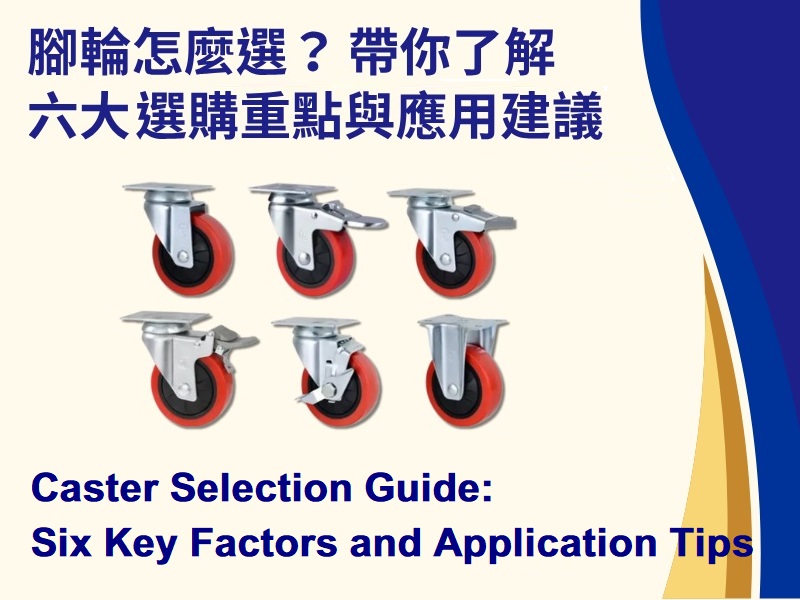Caster Selection Guide: Six Key Factors and Application Tips from THREE FISH CASTER

In various industries involving equipment mobility and material handling, the caster is a seemingly inconspicuous yet critical component. From industrial manufacturing and logistics to medical equipment and commercial spaces, caster wheels not only affect the maneuverability and efficiency of equipment but also directly impact safety and the overall operating experience. However, with the wide variety of industrial casters—featuring different types, specifications, materials, and functions—available on the market, many buyers often feel overwhelmed when making a selection.
As a professional industrial caster manufacturer, THREE FISH CASTER draws on its industry expertise to share six key factors you must consider when choosing caster wheels. These insights will help you identify the most suitable solution, ensuring your equipment moves more efficiently, safely, and with long-lasting durability.
1. Load Capacity — The First Priority in Caster Selection
Load capacity is the primary factor when choosing caster wheels. It determines whether equipment can operate safely and directly affects both caster lifespan and mobility performance.
A common mistake is considering only the equipment weight while ignoring the added load of materials and the dynamic impact forces during movement.
A practical formula:
(Equipmentweight+Maximumload)÷Numberofcasters×Safetyfactor(1.2–1.3)(Equipment weight + Maximum load) ÷ Number of casters × Safety factor (1.2–1.3) (Equipmentweight+Maximumload)÷Numberofcasters×Safetyfactor(1.2–1.3)
This ensures the chosen caster can handle unexpected situations during operation.
For applications involving slopes, frequent movement, or uneven outdoor surfaces, opt for heavy-duty casters with high impact resistance to avoid premature wear or accidents.
2. Material — Influencing Durability and Floor Protection
Caster material affects not only lifespan but also floor protection and rolling smoothness. Each material differs in hardness, friction coefficient, wear resistance, and oil resistance.
-
PU (Polyurethane) Casters – Ideal for smooth indoor floors; quiet, non-slip, wear-resistant, and floor-friendly.
-
Rubber Casters – Excellent shock absorption for rough surfaces; suitable for outdoor or vibration-sensitive applications.
-
Nylon Casters – High load capacity, wear and oil resistance; best for heavy-duty or special environments but less floor-friendly.
-
TPR (Thermoplastic Rubber) Casters – Combines rubber’s quiet operation with nylon’s durability; perfect for commercial and medical settings requiring low noise, anti-oil, and slip resistance.
Choosing the right material extends caster life, reduces maintenance costs, and helps maintain a safe, clean workspace.
3. Size and Mounting Method — Precision Matching
Caster size impacts mobility and handling. Larger diameters roll more easily over obstacles and uneven surfaces, while smaller wheels suit compact spaces or lighter loads.
Mounting types:
-
Top Plate – Common and stable; ideal for heavy or large equipment.
-
Threaded Stem – Flexible installation for medium and small equipment such as carts.
-
Grip Ring Stem – Quick to install; often used for furniture and display units.
Proper size and mounting ensure smoother movement, reduce operator fatigue, and minimize accident risks.
4. Consider the Actual Usage Environment and Industry
Different industries and environments require different caster specifications:
-
Medical – Quiet, antibacterial, corrosion-resistant; prevents infection and noise disturbance.
-
Electronics & Semiconductors – Anti-static design to protect sensitive components.
-
Food Processing – Oil-resistant, non-slip, and easy to clean to meet hygiene standards.
-
Warehousing & Logistics – High load capacity, wear resistance, and durability for improved transport efficiency.
-
Outdoor Construction – Waterproof, sand-resistant, shock-absorbing, and heavy-duty for reliable long-term operation.
5. Special Functions and Mobility Features
Modern equipment demands more than just basic mobility — efficiency and safety enhancements are also key.
-
Swivel Casters – Enhanced maneuverability in tight spaces.
-
Brakes – Securely lock equipment, essential for slopes or mobile machinery.
-
Shock Absorption – Protects sensitive instruments from vibration.
-
Anti-Static/Antibacterial – Meets the safety needs of specialized industries.
Choosing the right special features can improve safety, ease of use, and operational reliability.
6. Selecting Casters Based on Floor Type
Floor type impacts caster performance and longevity. Incorrect selection can damage both the caster and the floor.
| Floor Type | Recommended Caster Type | Key Features |
|---|---|---|
| Tile, Stone | PU (Polyurethane) or TPR | Quiet, non-slip, floor-friendly |
| Hardwood | TPR or PU | Elastic, prevents scratches |
| Epoxy | PU or Nylon | Wear-resistant, reduces black marks |
| Concrete, Industrial Floor | Nylon or Rubber | Heavy-duty, impact-resistant |
| Uneven Outdoor Surfaces | Large Rubber or Foam Wheels | Shock-absorbing, high grip, adaptable |
For high-value or easily damaged flooring, prioritize casters that combine functionality with floor protection.
THREE FISH CASTER - Professional Industrial Caster Manufacturer and Complete Mobility Solutions Provider
Founded in 1992, THREE FISH CASTER specializes in manufacturing industrial casters and mobility systems, committed to Taiwan-made quality and long-term reliability.
Over 10 Series of Caster Products:
-
Angel Series (Medical Casters)
-
Peacock Series (Light-Duty Casters)
-
Shark Series (Medium-Duty Casters)
-
Wolf Series (European-Style Brackets)
-
Cloud Leopard, Pegasus, and Titan Series (Medium- to Extra-Heavy-Duty Casters)
-
Dragon and Eagle Series (Special Wheel Designs)
-
Adjustable Leveling Feet, Carts, Hand Trucks, and Custom Products
Applications include:
- ✅ Medical Equipment
- ✅ Automated Production Lines
- ✅ Food & Beverage Processing
- ✅ Warehousing & Logistics
- ✅ Office Equipment
- ✅ Data Centers & Semiconductors
With ISO 9001 certification, patented technologies, and flexible customization services, we deliver high-quality caster wheels that meet your operational needs — backed by fast delivery and dependable after-sales support.